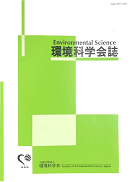
- |<
- <
- 1
- >
- >|
-
Seiya MAKI, Satoshi OHNISHI, Minoru FUJII, Kosuke KAWAI, Naohiro GOTO2024Volume 37Issue 1 Pages 1-14
Published: January 31, 2024
Released on J-STAGE: January 31, 2024
JOURNAL FREE ACCESSWaste management requires a comprehensive evaluation system for upgrading the efficiency of energy recovery/utilization and improving the recycling rate. Energy recovery and recycling rates need improvements to understand the actual status of waste emissions for each composition. However, few studies have focused on the geographical aspects of waste composition and generation. Therefore, this study estimated the relationship between household expenditure and waste composition and generation using integration data via a waste transportation model. Ridge regression analysis was used to obtain the unit waste composition and generation unit per unit of household expenditure from the integrated data. Using the generated unit data, the geographic distribution of the composition and generation was estimated for each waste. According to the obtained results, total waste generation was greater in highly-populated areas. However, the amount of waste generated per person was also higher in rural areas such as Hokkaido, Ishikawa, and Yamaguchi prefectures. Overall, this study presents a methodology for estimating waste composition and generation unit data per unit of household expenditure using an easy statistical method. Multiple years can be analyzed using this model, facilitating estimation of time-series changes in unit data.
View full abstractDownload PDF (3062K)
-
Takuya SUGIMOTO, Susumu TESHIMA2024Volume 37Issue 1 Pages 15-27
Published: January 31, 2024
Released on J-STAGE: January 31, 2024
JOURNAL FREE ACCESSAs educational and research institutions, universities have a social responsibility to create opportunities for students to acquire the knowledge, skills and mindset to contribute to building a sustainable society. Project-based learning (PBL) is one of the approaches to develop students’ capacity for their careers and contribute to a sustainable society.
At the Chiba University of Commerce, the student group SONE, established in 2018, plays a significant role in promoting energy conservation in the university’s effort to become a 100% renewable energy university. For example, in 2022, SONE launched an insulation workshop where students installed the secondary windows and insulation in a classroom in a “do it yourself” style, guided by carpenters. In preparation, the SONE students negotiated with the university’s facility management department and coordinated with an architectural design firm.
We interviewed SONE members to analyze how they felt about their growth in generic work skills and a frame of sustainability thinking. We found that students realized their progress in communication and project management skills through activities. On the other hand, some of them downgraded their self-assessments because they came to recognize the lack of their skills. Though only partially, they showed empathy between their activities and Sustainability Mindset, a way of thinking and behavior on sustainability.
View full abstractDownload PDF (699K) -
Ayano TAKEUCHI2024Volume 37Issue 1 Pages 28-32
Published: January 31, 2024
Released on J-STAGE: January 31, 2024
JOURNAL FREE ACCESSThe spread of COVID-19 that began in early 2020 has restricted activities at universities, including extracurricular activities such as participating in clubs and circles and on-campus activities similar to semi-regular activities that involve with teachers. There is concern that this may lead to a lack of education related to career development. At the same time, the possibilities for education are expanding via the use of online environment. The purpose of this paper is to examine the educational effects, using the activity of co-editing a column as a case study, which was practiced by students engaged in environmental activities under COVID-19.
As a result of organizing the students’ efforts, it was found that in addition to the acquisition of knowledge on environmental issues, the students were able to obtain the general skills required to promote environmental activities, such as the ability to coordinate, communicate, write, and proofread.
View full abstractDownload PDF (344K)
- |<
- <
- 1
- >
- >|